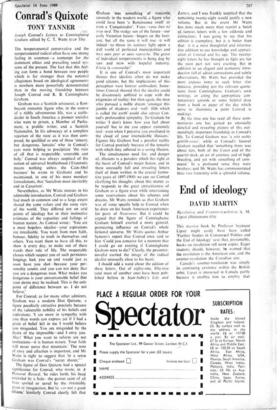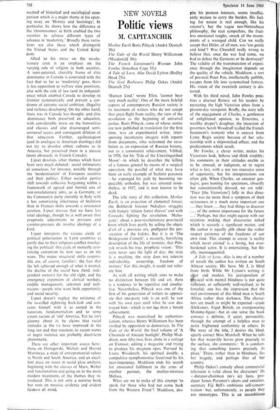End of ideology
DAVID MARTIN
Revolution and Counter-revolution S. M. Lipset (Heinemann 63s) This massive book by Professor Seymour Lipset might easily have been called `Further Studies in Consensual Politics and the End of Ideology' save that, presumably, books on revolution sell more copies. Eager students should, however, be warned that the revolution is the American one, and the counter-revolution the Canadian onc.
Canada's counter-revolution was simply its continuing existence within the British orbit. Lipset is interested in Canada partly because it enables him to employ that
method of historical and sociological com- parison which is a major theme in his open- ing essay on 'History and Sociology'. In particular, he shows how the difference in the 'chromosomes' at birth enabled the two societies to achieve different types of advance in 'modernity.' Broadly these varia- tions are also those which distinguish the United States and the United King- dom.
Allied to his stress on the revolu- tionary crux is an emphasis on the varying role of religion in both societies. A semi-paternal, churchly frame of elite dominance in Canada is associated with the fact that so far as 'modernity' goes, there is less opposition to welfare state provision; also with the rule of law (and its independ- ence) which enabled Canada to develop its frontier systematically and prevent a syn- drome of extreme social ambition, illegality and violence developing. On the other hand, there was in Canada less thought; and elite dominance both preserved an education, with considerable stress on the humanities and classics and also discouraged semi- universal access and consequent dilution of that education. Further, egalitarianism (and its analogue in American theology) did not try to dissolve ethnic cultures as in America, but preserved them in a mosaic (most obviously in French Canada).
Lipset develops other themes which have been very much debated: social intimations of consensus, for instance, notably through the 'modernisation' of European societies and their politics. Either socialist parties shift towards collective bargaining within a framework of agreed and limited sets of non-revolutionary aims, as in Germany, or the Communist party (notably in Italy with a less constricting inheritance of Stalinism than in France) shifts towards a revisionist position. Lipset stresses that we have less total ideology, though he is well aware that pragmatic adjustments to pressure and counter-pressure do involve ideology of a kind.
Lipset interprets the vicious circle of political polarisation in Latin countries as partly due to their religious conflict overlay- ing the political: this cycle of mutually rein- forcing extremism he now sees as on the wane. The major structural shifts respons- ible are, of course, familiar: the fact that the left achieved enough of what it wanted, the decline of the social base (land, inde- pendent owners) for the old right, and the emergency expansion of clerical workers, middle management, salesmen and tech- nicians—people who want both opportunity and social security.
Lipset doesn't neglect the existence of the so-called rightwing back-lash and con- cerns himself with it as rooted in the naturism, fundamentalism and to some extent racism of `old' America. Yet he isn't gloomy about it; he claims that racial attitudes in the us have improved in the long run and that reactions to recent waves of negro violence are probably short-term phenomena.
There are other important essays here: those on Ostrogorski, Michels and Harriet Martineau, a study of entrepreneurial values in North and South America, and an excel- lent piece on issues in social glass analysis, beginning with the classics of Marx, Weber and functionalism and going on to the more modern treatments of the themes they in- troduced. This is not only a massive book but rests on massive evidence and evident fairness of mind.



































 Previous page
Previous page